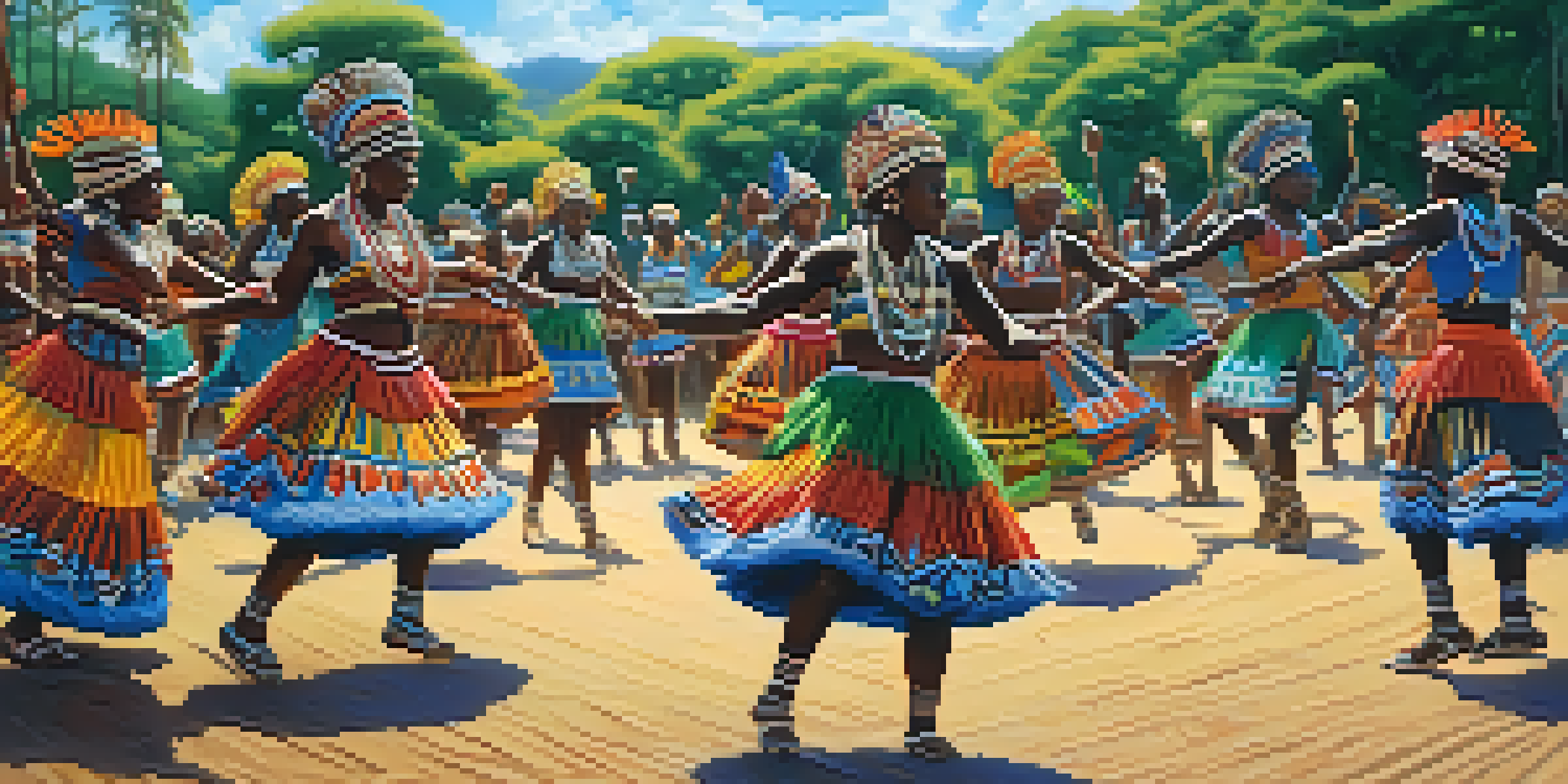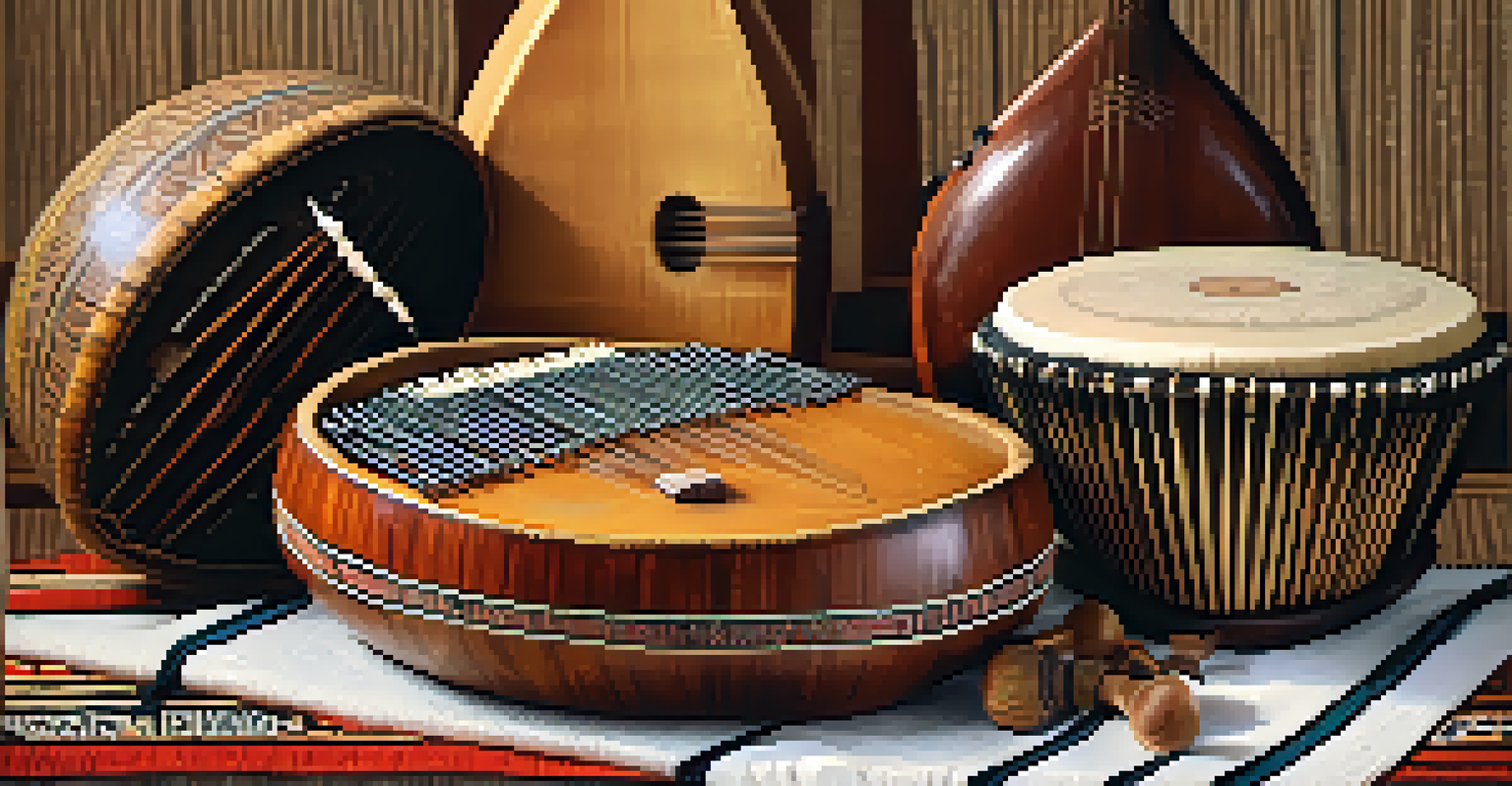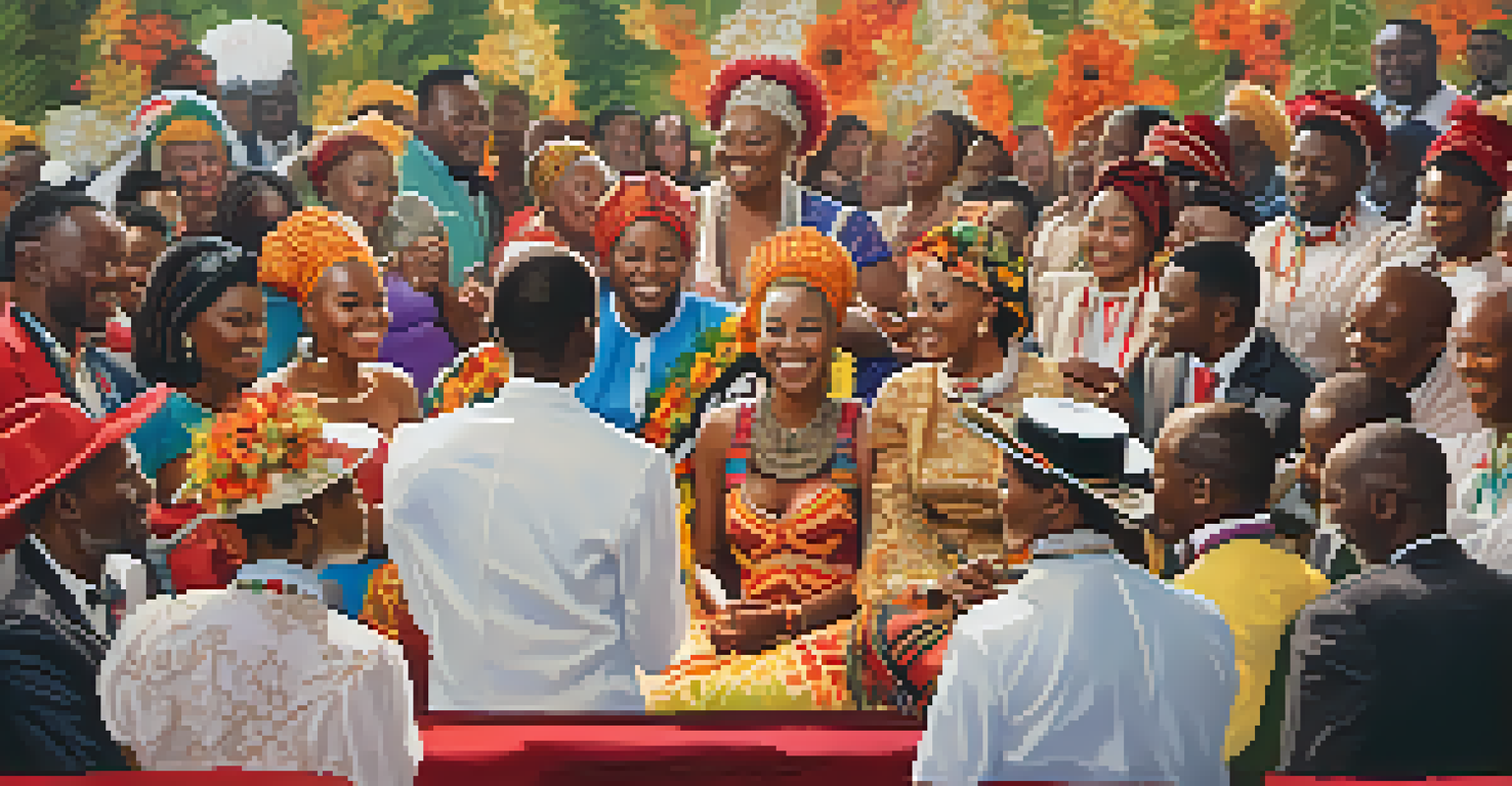The Role of Music in African Tribal Ceremonies

The Historical Importance of Music in African Traditions
Music in African tribal ceremonies dates back centuries, serving as a crucial form of communication and storytelling. It embodies the history, beliefs, and values of various tribes, allowing them to pass down traditions through generations. The rhythms and melodies used often reflect the specific cultural context of a community, making each performance unique.
Music is the shorthand of emotion.
For instance, the use of drums and percussion instruments in ceremonies is not just for entertainment; it symbolizes the heartbeat of the community. These instruments connect the participants to their ancestors, evoking memories and emotions that enrich the spiritual experience. By using music as a narrative tool, tribes can share their collective identity and heritage.
Furthermore, music often accompanies important life events such as births, marriages, and funerals, marking these milestones with a sense of communal celebration or mourning. Therefore, understanding the historical significance of music in African tribal ceremonies allows us to appreciate its role as more than just art—it is a vital thread in the fabric of cultural identity.
Types of Music Used in Tribal Ceremonies
African tribal music is incredibly diverse, with each tribe having its own distinct styles and instruments. Common elements include vocal chants, drumming, and the use of traditional instruments like the mbira or kora. Each type of music serves a specific purpose, contributing to the mood and meaning of the ceremony.

For example, during a wedding ceremony in the Zulu tribe, songs are sung that celebrate love and unity, while the rhythmic drumming adds an energetic pulse to the event. Conversely, during a funeral, somber melodies may be performed to honor the deceased and help the community process their grief. This use of contrasting musical styles highlights the versatility of music in expressing a range of human emotions.
Music as Cultural Identity
Music serves as a crucial medium for African tribes to communicate their history, values, and collective identity through generations.
The choice of music is also influenced by the occasion and the messages that need to be conveyed. The interplay of different musical forms not only enhances the ceremony but also reinforces social bonds among community members, making each event a collective experience.
The Role of Dance in Music-Infused Ceremonies
Dance is an integral part of many African tribal ceremonies, closely intertwined with music. The movements often reflect the meanings behind the songs, creating a visual representation of the stories being told. Dancers express emotions and cultural narratives through their bodies, bringing the music to life.
The beautiful thing about music is that it transcends language.
In many tribes, dance is not just a form of entertainment but a sacred act that connects participants with the spiritual realm. For instance, during initiation rites, specific dances may symbolize the transition from childhood to adulthood, reinforcing communal values and expectations. This blend of music and dance fosters a deep sense of belonging and identity among participants.
Moreover, the communal aspect of dance encourages participation from all members, breaking down barriers and promoting unity. As everyone joins in, the collective energy boosts morale and strengthens the bonds within the community. This synergy between music and dance is what makes African tribal ceremonies so vibrant and memorable.
Spiritual and Religious Significance of Music
In many African cultures, music serves a spiritual purpose that transcends the physical realm. It is often believed that music has the power to invite spirits, celebrate deities, and serve as a medium for communication with ancestors. This connection to the spiritual world imbues ceremonies with profound meaning.
For example, during rituals dedicated to the ancestors, specific songs are performed to honor their presence and seek their guidance. The act of singing and playing instruments becomes a form of prayer, enhancing the spiritual atmosphere of the ceremony. This highlights how music is not only a form of expression but also a tool for invoking spiritual connections.
Dance Enhances Ceremonial Music
In African tribal ceremonies, dance complements music, creating a vibrant expression of cultural narratives and fostering community unity.
The spiritual significance of music also promotes healing and emotional release. Many ceremonies incorporate songs that address themes of forgiveness, hope, and renewal, helping participants process their feelings. By integrating music into religious practices, tribes can foster a deeper sense of spirituality and community cohesion.
Music as a Tool for Social Cohesion
Music in African tribal ceremonies plays a vital role in fostering social cohesion within communities. It acts as a unifying force that brings people together, encouraging participation and collaboration. The shared experience of music strengthens relationships among individuals, reinforcing the sense of belonging.
During communal gatherings, group performances create an atmosphere of togetherness, where everyone is encouraged to contribute. This collective involvement builds trust and solidarity, essential elements for thriving communities. The shared joy of music-making enhances interpersonal connections, creating lasting bonds.
Moreover, music serves as a reminder of shared values and cultural heritage, which can be particularly important in times of change or conflict. By celebrating their identity through music, tribes can reaffirm their unity and resilience, ensuring that their traditions endure across generations.
Contemporary Influences on Traditional Music
As globalization continues to shape cultural landscapes, African tribal music is experiencing new influences. While traditional forms remain important, contemporary elements are being integrated, leading to innovative expressions of cultural identity. This fusion often attracts younger generations, bridging the gap between old and new.
For example, many contemporary African musicians blend traditional instruments and rhythms with modern genres like hip-hop or reggae. This not only keeps the music relevant but also showcases the adaptability of traditional practices. By embracing change, tribes can ensure their musical heritage continues to resonate with future audiences.
Preserving Music Amidst Change
Efforts to document and teach traditional music are vital for maintaining cultural identity and ensuring the survival of African music traditions.
However, this evolution also raises questions about cultural preservation. Striking a balance between honoring traditional music and embracing innovation is crucial for maintaining authenticity. By acknowledging these contemporary influences while respecting their roots, African tribal music can thrive in a modern context.
Preservation of African Music Traditions
The preservation of African music traditions is essential for maintaining cultural identity amidst rapid globalization. Many tribes actively work to document and teach their musical practices to younger generations, ensuring that these rich traditions do not fade away. This transmission of knowledge is vital for cultural continuity.
Community workshops, festivals, and educational programs often play a significant role in this preservation effort. By engaging youth in music-making and storytelling, tribes can instill a sense of pride and responsibility towards their heritage. This hands-on approach allows traditions to evolve while still honoring their origins.

Additionally, technology has become an important ally in preserving African music. Digital platforms enable the sharing of music globally, allowing traditional sounds to reach wider audiences. This exposure can spark interest in cultural traditions, encouraging a revival of interest in African music and its ceremonies.